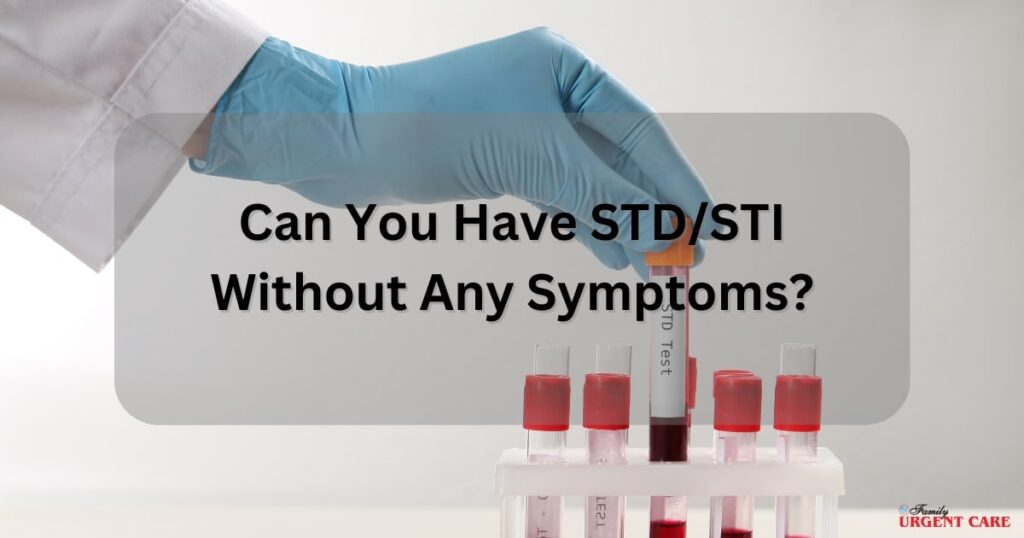Imagine carrying a sexually transmitted infection or disease and not even knowing it. Scary, right? STDs or STIs have become more common in the past years.
In fact, the CDC estimates that one in five Americans have STIs, and most of them are completely unaware because some infections don’t have any symptoms.
STIs or STDs can often lurk in the shadows, silently increasing your risk of spreading the infection, especially young adults aged 24 to 34 years.
In this blog, we’ll explore the asymptomatic STDs and share practical tips on how to keep yourself safe. It’s time to take a closer look!
How Long Does It Take For STD Symptoms To Show Up?
Most people think that they can’t have an STI or STD without any symptoms. But that’s not true!! STD symptoms can take a few days or even weeks before they appear. Or surprisingly, they may never appear at all too!
Gonorrhea, Chlamydia and Herpes Simplex Virus are some of the most common STDs that start with no symptoms, as reported by the American Society of Microbiology.
So, what’s happening during this time? After exposure to the pathogen (virus, bacteria, etc.), the period before symptoms appear is known as the incubation period. During this phase, the infection silently develops in your body, even though you might not feel any different.
| STD/STI | Incubation period |
| Chlymadia | 7-21 days |
| Genital Herpes | 1-14 days |
| HIV | 2-4 weeks |
| HPV | 1 month – 10 years |
Some infections can enter a dormant or latent phase, where the virus or bacteria stays in the body without symptoms. For example, HIV can remain inactive for years without showing signs of AIDS, known as a latent STD.
In other cases, the infection “sleeps” and shows no symptoms but can reactivate later, also known as dormant STD.
Therefore, not having any symptoms doesn’t mean that you’re all clear and shouldn’t get tested. Regular testing is crucial, even if you feel fine.
What Are The Usual Symptoms of STD In Males and Females?
Although some STDs are asymptomatic, most of the time, even the tiniest sign can hint that something’s wrong. Here’s a quick list of what to keep an eye on:
- Pain during intercourse
- An unusual discharge from the vagina or penis
- Painful or burning urination
- Pain or swelling in testes in males
- Unusual vaginal bleeding in females
- Lower abdomen pain
- Fever (may or may not have)
- Sore or swollen lymph nodes, particularly in the groin area.
If you or your partner notices any of these symptoms, it’s better to visit a nearby healthcare provider and get tested immediately.
But here’s where it gets tricky! Most people can carry an infection without even knowing it! So, how do you stay safe when things aren’t always obvious? Keep reading further!
What To Do If You Have STD Without Any Symptoms?
First and foremost! Get tested. CDC recommends all sexually active men or women get tested for STDs at least once a year.
If you suspect you have an STD, it’s also important to stop engaging in sexual activity until you’ve been tested or received guidance from your healthcare provider.
Remember, early detection and treatment can stop the transmission of STDs and even reduce future complications.
Once you’ve received your test results and the diagnosis is confirmed, you can discuss them with your provider for proper treatment.
However, if you test negative, you can talk to your provider about strategies for safer sex practices and about other preventative measures.
Five STDs You Can Have Without Knowing
Have a look at these top five asymptomatic STDs to understand the importance of why getting STD testing regularly is important, even if you don’t have any symptoms.
1. Chlamydia
The most common STI, also known as ‘silent infection,’ which infects both males and females, is often asymptomatic. However, after some days or weeks, you may notice mild to moderate symptoms such as pain while urinating, unusual vaginal discharge or pain in the pelvis region, etc.
Anyone sexually active can get chlamydia without even knowing and infect their partners. Therefore, it is vital to receive regular STD testing because it’s easy to spread this silent infection to your partner.
2. Gonorrhea
This is a bacterial infection that is common among young people aged 15-24. After exposure to the bacteria, symptoms take almost two weeks to develop. However, some people may not have any symptoms even though the bacteria may reside in their body.
Gonorrhea can also be diagnosed with a simple urine test. You can even visit a nearby urgent care clinic to get tested for STDs or STIs
3. HPV
Human Papilloma Virus is quite common in the US and mainly occurs in younger people aged 15 to 25. It may often go unnoticed as the symptoms take some time to appear, or you may never experience any symptoms.
According to the CDC, some people find out that they have HPV when they experience genital warts (small bumps or growth around the genital area or rectum).
4. HIV
About 1.3 million people in the United States have HIV, with the highest rates in the states of Louisiana, Georgia, and Florida (reported in 2021).
HIV starts with flu-like symptoms such as fever, chills, rash, sore throat, fatigue, etc. But in the later stages, you may not experience any symptoms for several years. In one research, it is reported that an estimated 10 to 60% of people will not experience any symptoms of HIV, even during early stages.
5. Syphilis
In 2022, WHO reported that almost 8 million adults between 15 to 49 years suffered from syphilis. It often goes unnoticed.
Mostly, the symptoms of syphilis depend on the stage of infection. In the initial stages, most people only notice one or two sores on the genitals.
Some people may not notice or ignore them, thinking of them as a pimple or other skin lesions. Left untreated, you may start experiencing rash or flu-like symptoms.
In the later stages, the sores may disappear and you may not experience any symptoms. At this stage, the virus may reside in your body and if left untreated, it can lead to future complications.
Can You Go To Urgent Care For STD Testing?
Sure, you might think urgent care is just for things like sprains or the flu, but that’s not the full story! You can also count on them for STD testing, diagnosis, and treatment.
It’s a safe, convenient option that’s here to help with more than just urgent medical needs. You can even visit our clinic if you live in or near Indiana or Illinois.
We are well equipped with state-of-the-art facilities and highly experienced healthcare providers and doctors who are experts in diagnosing STDs, listen actively to your symptoms, offer some lab testing if needed, and then provide a proper treatment plan to recover completely.
One thing you definitely don’t want to overlook! Diagnosing and treating STIs or STDs early can do wonders for your sexual health. Not only can it lower the chances of infertility, but it can also help prevent bigger issues like pelvic complications down the road.
Curious to know what you can expect during your visit? click to visit STD appointment at urgent care service page.
Most Frequently Asked Questions Related To Asymptomatic STD
To make sure you don’t have an STD, the best step is to get tested. You can visit a nearby healthcare provider or urgent care clinic, where they’ll ask about your sexual history and any symptoms. Even if you’re symptom-free, they may do a physical or pelvic exam to check for infections or offer lab testing. Regular testing is the only way to know for sure and stay on top of your health.
Yes, STIs are quite common, especially in those people who are sexually active. Most STDs or STIs can be treated and managed. However, early detection and treatment is vital. Even if you have a diagnosed sexually transmitted infection or disease, you can still be healthy and live a normal lifestyle.
Use latex condoms whenever you have sex.
Wash before and after intercourse.
If you’re sexually active, get tested at least once a year.
Get vaccination for Hepatitis B after consulting your healthcare provider.

